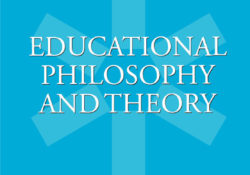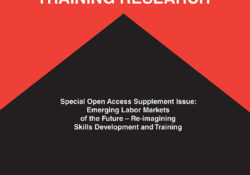tandfonline.com har udgivet en rapport under søgningen „Teacher Education Mathematics“: ABSTRACT ABSTRACT This paper analyzes the remarkable success of Dutch scientists near the end of the nineteenth century, as exemplified by five Nobel laureates in the period 1901–1913. Some historians suggest that the key factor contributing to the sudden rise of Dutch science was the establishment of a new type of high school, called HBS, which generated unprecedented social mobility of middle-class pupils to Dutch universities. The HBS also provided a pathway for its science teachers to write a PhD thesis outside the walls of the university. Taking a core-periphery approach, we compare the effects of an HBS-background (periphery) and Royal Academy membership (core) on the recognition that Dutch professors. Consistent with core-periphery theory, we find that professors who taught… Continue Reading →
Like this:
Like Loading...
tandfonline.com har udgivet en rapport under søgningen „Teacher Education Mathematics“: Link til kilde
Like this:
Like Loading...
tandfonline.com har udgivet en rapport under søgningen „Teacher Education Mathematics“: ABSTRACT ABSTRACT The fourth industrial revolution will bring extensive changes in the nature of work. While automation is likely to displace workers, new occupations will be created. Emerging occupations are likely to be disproportionately concentrated in the nonroutine and cognitive category, and require skills that cannot be easily automated. This paper argues that meeting the skill demands of the fourth industrial revolution requires strengthening learnability – the willingness and ability to learn, unlearn, and relearn – among the current and future workforce. The paper provides a summary of the literature on how automation impacts jobs. In this context, the paper considers the implications for workforce development in terms of both skills supply and demand. Specifically, the paper describes emerging trends… Continue Reading →
Like this:
Like Loading...
eric.ed.gov har udgivet: Private and public investments in early childhood education have expanded significantly in recent years. Despite this heightened investment, we have little empirical evidence on whether children today enter school with different skills than they did in the late nineties. Using two large, nationally representative datasets, this paper documents how students entering kindergarten in 2010 compare to those who entered in 1998 in terms of their teacher-reported math, literacy and behavioral skills. Our results indicate that students in the more recent cohort entered kindergarten with stronger math and literacy skills. Results for behavioral outcomes were mixed. Increases in academic skills over this period were particularly pronounced among black children. Implications for policy are discussed. [This paper was published in „Educational Researcher“ v46 n1 p7-20 2017 (EJ1132546).] Link til… Continue Reading →
Like this:
Like Loading...
tandfonline.com har udgivet en rapport under søgningen „Teacher Education Mathematics“: ABSTRACT ABSTRACT This article aims to present the transformations as well as the decline of the Froebelian occupation of paper folding that took place in Great Britain between 1851 and the 1920s. Froebel’s original intention was to transmit implicit mathematical knowledge to be learnt by means of folding several shapes. In contrast to his account of paper folding, which presented it as a way of understanding several abstract mathematical concepts, the manner in which this occupation was re-conceptualised in Great Britain tells a different story. After surveying the changes in the British conception of Froebelian ideas in the second half of the nineteenth century through the various published manuals, I then explore the period between 1892 – the opening of… Continue Reading →
Like this:
Like Loading...



